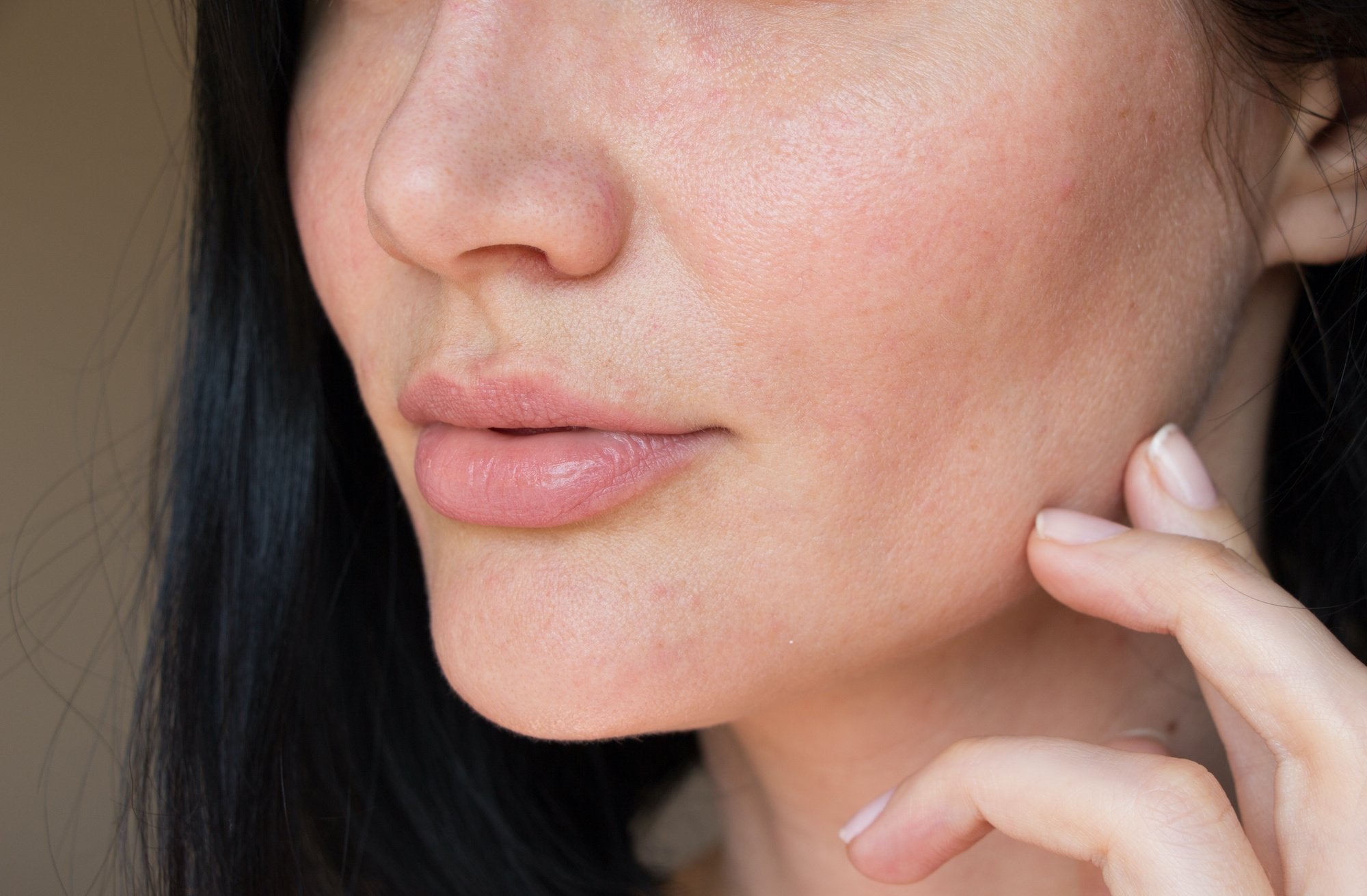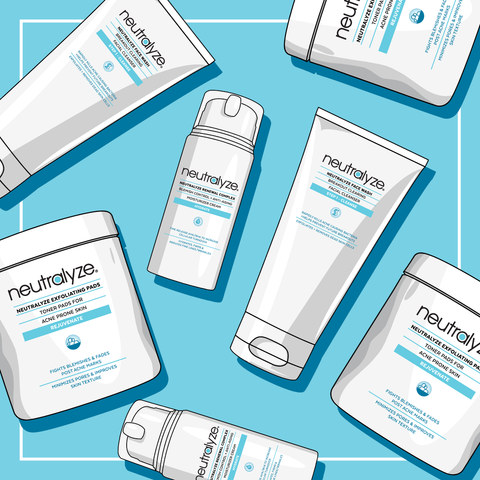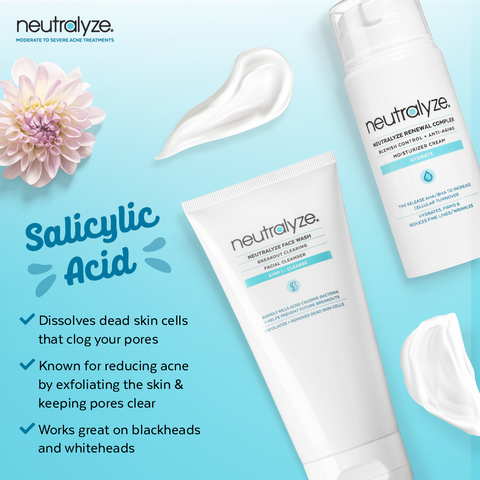Fact or Fiction: Getting the Real Deal on Common Acne Myths

There seem to be about as many myths concerning acne as the number of teens and adults who experience this skin condition.
Scientifically unverified information about acne's causes and solutions has been passed down from generation to generation, either by word of mouth or media, although many articles are now debunking formerly popular but false beliefs.
The Lowdown on Acne Myths
You may have heard some of these myths from your parents or friends, and you may even believe them yourself. Check out some of the common misconceptions below and discover the truth about acne.
Acne only happens during puberty.
Fact: Up to 80% of males and females between ages 11 and 30 will experience acne sometime in their lives. Acne can develop even among adults in their 40s or 50s due to hormonal changes. It's also influenced by—but not caused by—stress, lifestyle choices, and their choice of beauty products.
Even babies can have acne at two weeks (neonatal acne) or after six weeks (infantile acne) due to fungus, rough fabric, and infant formula.
There's also the idea that acne will go away on its own, but this doesn't usually happen. If you have persistent acne, consult a doctor so you won't have to deal with permanent scarring later.
Acne treatments don't work for some people.
OR: There's only one treatment that will work.
Fact: No one is hopeless when it comes to acne. If yours hasn't improved after trying different products, you must see a dermatologist who can point you to the treatment or solution that your skin needs. There are now solutions made of nitric oxide, salicylic acid, and mandelic acid that can effectively treat severe acne.
At the same time, a solution that worked for your friend's acne may not necessarily be successful on your skin. It will depend on the severity of your acne and your skin type.
Once treatment starts, your acne will clear up after a week or two.
Fact: Besides undergoing treatment or applying your chosen acne solution, you'll need to practice regular skincare habits and maintain a healthy lifestyle to keep your skin clear. Wait for at least four weeks to a few months to see tangible results. Follow instructions and don’t fall for the related myth that the more solution you apply, the faster your skin will heal.
Acne results from dirty skin.
Fact: It's not dirt itself that causes acne. The blackheads that you see on your face are a combination of dead skin cells, oil produced by your body, and acne-causing bacteria that form in your clogged pores. The dead skin in the open pore turns black when it reacts to oxygen in the air.
Nevertheless, it's a good practice to wash your face twice daily with a mild cleanser, especially after you sweat or exercise, get in contact with engine oil, or work in front of a grill or stove.
But avoid excessively washing your face or using harsh scrubs as these may cause your skin to dry or redden.
You can develop acne by eating too much dairy, chocolate, and greasy food.
Fact: The effect of food and diets on acne is a controversial topic. Some studies show that food with a high glycemic index or sugary food and certain dairy products can worsen acne because they cause inflammation throughout your body and make your glands produce more sebum. But they're not the sole contributors to acne.
Stress can cause acne breakouts.
Fact: Stress doesn't cause breakouts per se, but it affects how your body produces sebum. Your endocrine system releases cortisol and androgens when you're stressed. Hormones increase sebum or oil production. When this natural oil clogs your pores, it becomes the environment for acne-causing bacteria to grow.
You can squeeze pimples so they can disappear sooner.
Fact: More bacteria might enter your pimple if you pop it, making it more inflamed. This might cause scarring.
You also might push bacteria further into your skin when you squeeze a pimple before it's fully formed. Leave the pimple attached for a week or two to completely heal.
A suntan can help heal acne faster.
Fact: Spending time under the sun or in a tanning bed may make you feel like it's drying your skin and therefore healing your acne. However, prolonged exposure to ultraviolet rays may irritate your skin besides putting you at risk of skin cancer. Dry skin can become prone to future breakouts unless it's moisturized. Otherwise, it's a weak barrier against bacteria and fungi.
Acne develops only on oily skin types.
Fact: Acne can affect different types of skin. Moreover, your skin type can change with the seasons and as you age. Dry skin that cracks and peels can clog pores. Microscopic fissures in dry skin can welcome the entrance and growth of acne-causing bacteria.
Makeup makes your skin acne-prone.
Fact: Oil-based makeup may irritate the skin because it can clog your pores. Pick products with "oil-free," "non-acnegenic," or "non-comedogenic" labels. When you need to use a sunscreen, choose one with an SPF of at least 30 and be sure it's not oil-based and is "non-comedogenic,” meaning it won't cause comedones (blackheads and whiteheads).
Masturbation and sex can cause acne flare-ups.
Fact: While both activities can temporarily raise your testosterone levels, neither of them triggers acne. However, there's such a thing as pregnancy acne. If you've had acne before getting pregnant, you're most likely to experience it during your first trimester.
Some More Facts
Both biological and external factors can affect your acne. Besides hormonal triggers and factors mentioned above, acne is also influenced by the following:
Genetics
You're likely to have acne if your parents and siblings also have acne.
Immune System
Lack of sleep and a poor diet can weaken your immune system. When this happens, you're unable to fight off potentially disease-causing microbes, including zit-causing bacteria.
Gender
Testosterone is present in males and females, but males produce them 40 to 60 times more than females do. High levels of testosterone overstimulate oil glands, the resulting sebum of which contributes to acne development. This makes acne more prevalent among males during their teen years.
Knowledge Is Key
As in any health challenge, always refer to authoritative sources when finding out more about acne or verifying any new information.
Reputable sources include:
Hospitals, health institutes, or medical associations
The websites of the Mayo Clinic, Johns Hopkins Medicine, the American Academy of Dermatology, the American Academy of Pediatrics, and the health departments of universities and colleges usually don't endorse particular products. They explain acne causes, current treatments, and new research or developments.
Government bodies
The United States Department of Health and Human Services, the National Institute of Arthritis and Musculoskeletal and Skin Diseases, the US National Library of Medicine, the Food and Drug Administration, and other government agencies usually release advisories when they ban or restrict the use of certain products. They usually republish studies conducted by professionals.
Physician-authored or reviewed articles
The Internet is filled with health and beauty websites, including those owned by brands and established magazines. Dermatologists, surgeons, and medical practitioners can shed light on acne and various skin ailments, whether they write about these issues or are quoted by bloggers and health reporters. Some practitioners may endorse or recommend brands on their websites.


